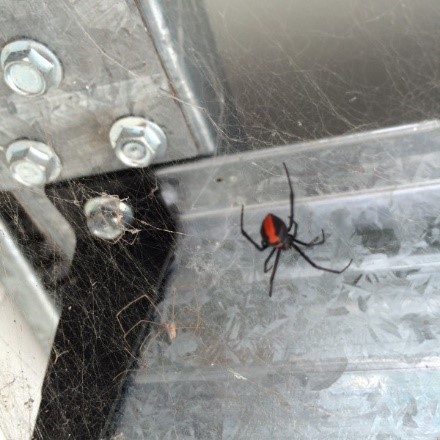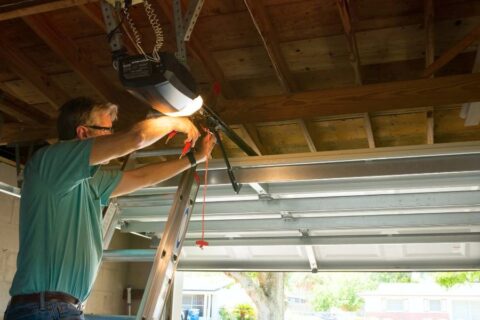Keeping Your Garage Free of Unwanted Visitors
The garage might not be your primary living space, but you still don’t want rodents, insects, and other pests making it their home. After all, critters can damage your belongings, spread germs, and create an unpleasant or smelly environment. If you’d rather not share your space with them, learn how to prevent rodents and insects in your garage for a clean, pest-free space.

Common Garage Pests
Here are some of the most common garage invaders in the Chicago area:
- Rodents: Mice, rats, chipmunks, and squirrels don’t need much space to squeeze into your garage. Once in, they chew through insulation, wires, and cardboard boxes. If you hear scratching sounds at night or find droppings along the walls, you might have a rodent problem.
- Insects: Ants, spiders, cockroaches, and silverfish may decide to make your quiet, dark garage their new home. Most insects are harmless, but invaders like the brown recluse or black widow spider may pose a risk to humans and pets.
- Wildlife: Racoons, birds, and bats may come hunting for food or a place to build a nest. Unfortunately, wildlife can carry diseases and make a mess in your garage.
Why Do Pests Love Garages?
Pests don’t invade garages at random. They are drawn in by three main factors:
- Shelter from harsh weather: Many pests seek out the steady temperatures garages offer, especially during Chicago’s freezing winters. Garages are protected caves, providing a warm space in the winter and a cool refuge in the summer.
- Easy access to food and water: An open or spilled bag of pet food, birdseed, or garbage is a buffet for pests. Leaky pipes or condensation also provide the moisture many pests need to survive.
- Clutter provides hiding spots: Stacked boxes, old furniture, and neglected corners create ideal hiding spots for pests. Rodents love to burrow into insulation, and spiders prefer to build their webs in dark, undisturbed areas.
How Pests Gain Entry to Your Garage
Pests don’t need an open invitation to enter. They have plenty of ways to sneak in:
- Cracks in the outer walls: Tiny holes in the walls and foundation or around windows and doors are perfect entry points for insects.
- Gaps around the garage door: Garage doors with worn-down or missing weatherstripping provide easy access.
- Open doors: Leaving the garage door open, even briefly, invites pests in. A handful of mice or roaches can quickly turn into a bigger problem if they start reproducing.
- Unsealed vents and drains: Air vents without screens or uncovered drain openings offer another pathway inside. Insects and small rodents can crawl through these holes with ease.
How to Get Insects Out of Your Garage
If you already have an infestation, don’t wait to take action. Here’s how to reclaim your garage:
- Clean and declutter: Start with the basics. Remove spilled food, garbage, or standing water that attracts unwanted guests. Then, look behind boxes and other items to see where pests have established nesting spots.
- Use traps and repellents: If you suspect rodents, set mouse traps or bait stations. For cockroaches and other insects, use sticky traps. Natural repellents like peppermint oil also deter mice and spiders while being safe to use around pets.
- Get help if needed: Some infestations require professional pest control. If you have a persistent rodent problem or large wildlife in your garage, leave it to the experts.
Keeping Garage Pests Out
Once you’ve gotten rid of the pests, make sure they don’t return with these garage pest control tips:
- Close the door: It sounds simple, but many infestations start when the garage door is left open for a long time. Make it a habit to close it promptly after going in or out.
- Seal up entry points: First, seal gaps and cracks with caulk or spray foam. Then, assess the weatherstripping around entry doors and the garage door itself. If light shines through, that means pests can get in. Finally, install mesh screens over vents and drains to block these entry points.
- Keep food out of the garage: Store pet food, birdseed, and other items in airtight containers, preferably inside your home rather than in the garage. Empty trash cans weekly and store them outside if possible.
- Reduce moisture: Many pests thrive in damp environments. Fix leaks, improve ventilation, and use a dehumidifier to make the space less inviting.
- Use pest deterrents: Place mothballs or cedar blocks in corners to keep insects away. Bay leaves or coffee grounds scattered near entry points are effective roach and ant deterrents.
- Maintain a clean garage: Keep things organized and off the ground with shelves, cabinets, and pegboards. Discard unused items, and sweep regularly to remove crumbs and debris.
Partner with Better Built Garages
A secure, organized garage is a rodent-proof garage. At Better Built Garages, we can help you achieve just that. We are the leading detached garage and shed builders in the Chicago area. We also upgrade existing garages with pest-resistant improvements like storage solutions, weatherproofing, and insulation. Our family-owned business takes pride in delivering high-quality craftsmanship and outstanding customer service. Contact us today to request a project estimate.


